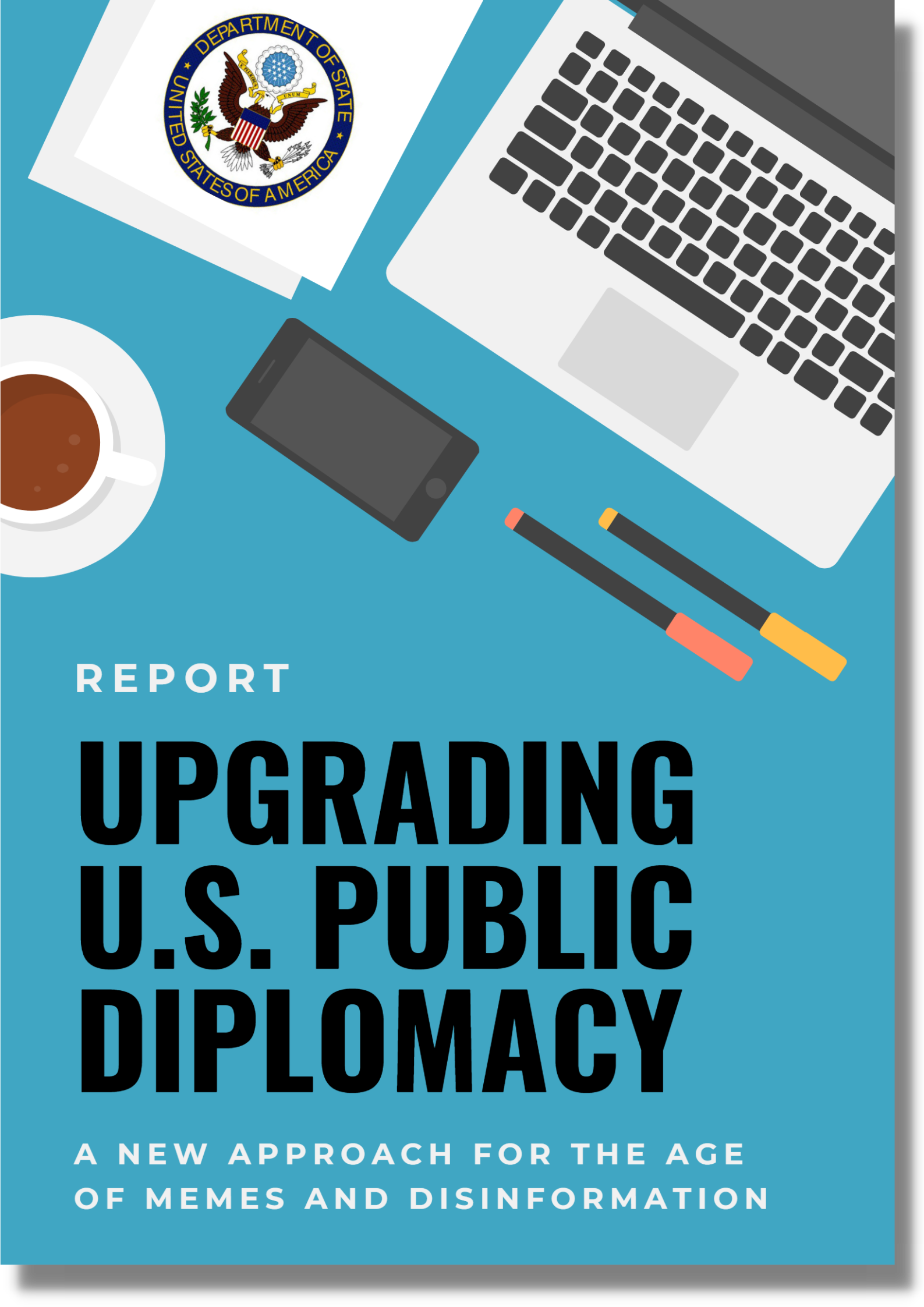Upgrading U.S. Public Diplomacy: a behind-the-scenes look at a new model for reform.
What should the future of diplomacy look like? Upgrading U.S. Public Diplomacy: A New Approach for the Age of Memes and Disinformation, published in collaboration with the Atlantic Council, outlines a set of principles and actions to strengthen the State Department’s institutions, domestically and abroad. The report offers a vision for public diplomacy institutions that set meaningful strategic goals, design and evaluate programs using evidence and data, customize messaging and programs for hundreds of distinct overseas audiences, and connect meaningfully with audiences here in the United States. Read the full report on the Atlantic Council website.
What makes this report unique?
How can a deeply hierarchical organization like the State Department ensure the best ideas from inside the bureaucracy rise to the top? We are mindful of the risk of national security reform efforts to be coopted by turf-minded actors — at fp21, we believe that reform that is inclusive of those most deeply rooted in the system is more likely to produce lasting, positive impact.
In working on this report, we sought to model a better process and structure for strategic planning. We recruited people with diverse skill sets and experiences, continually questioned what perspectives were not represented in the discussion, and actively sought out ways to bring in missing voices through participatory processes.
We leaned heavily on design thinking methods that encourage participants to bring a healthy dose of empathy to the table for the “users” of the recommendations we were generating. We agreed on a decision-making model designed to draw out ideas from all participants and identify areas of consensus or divergence. We examined what ideas have been tried before, what succeeded, and what failed, aspiring to base our recommendations on the best possible evidence of what works. We repeatedly tested our ideas by consulting with scholars and other public diplomacy practitioners and discarded those we could not stand behind with confidence.
We believe that more inclusive reform processes like this will support a healthier dialogue among working-level officials, political leadership, and outside observers. A healthy ecosystem of research and debate on how our government functions efficiently and effectively on behalf of the American people is a vital feature of a thriving democracy.
fp21 cannot take all (or even most) of the credit for this excellent report. Instead, this effort arose organically from a group of current and former State Department officials committed to advancing the mission of an institution to which we all remain committed. The process was facilitated in large part by Wren Elhai, joined by a group of current and former State Department officials: Marta Churella, Naima Green-Riley, Amirah Ismail, Graham Lampa, Molly Moran, Jeff Ridenour, Megan Tetrick, and myself. Unfortunately, the culture of the State Department does not always reward innovation. So I wanted to commend the authors not just for the quality of the report, but also their courage to stand up and push for change.
The authors of this report bring an extraordinary set of skills to this conversation, many of which are under-utilized in today’s State Department: cutting-edge competency on digital platforms and audience analysis, data science and design thinking, innovative approaches to content creation and messaging. All of this on top of their many years of hard-earned experience wrestling with today’s public diplomacy challenges. Finally, our partnership with the Atlantic Council brought immeasurable experience to the discussion.
Ultimately, fp21’s goal in participating in the writing of this report was to help ensure this report spurs real progress. We know that good ideas alone will not create change. That is why fp21 is so committed to nurturing partnerships like this. We are building a coalition -- a constituency -- of people and organizations who understand the necessity of upgrading our foreign policy, and are willing to raise their voices. We know that the status quo will resist change unless enough people demand change.
Today’s complex international challenges will not be solved by yesterday’s tools. We hope you will join us in calling for upgrading U.S. diplomacy and demanding a new approach for the age of memes and disinformation.



